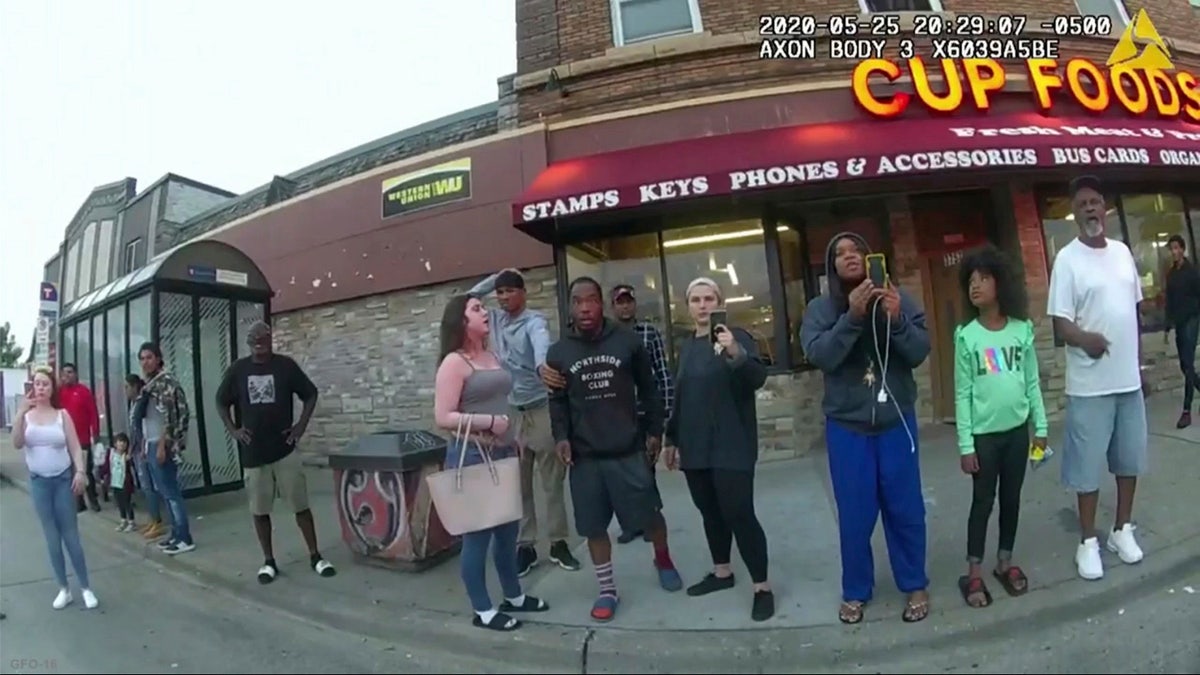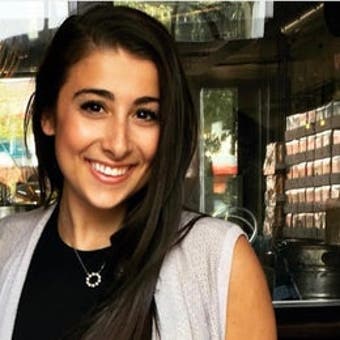A Minneapolis firefighter who came upon the scene of George Floyd's deadly arrest became emotional during her testimony Tuesday while recalling being stopped from administering aid on the second day of ex-Minneapolis police officer Derek Chauvin's murder trial.
Before questioning Genevieve Hansen, a firefighter for the Minneapolis Fire Department and a trained EMT, video footage was played showing her pleading with the officers outside the Cup Foods convenience store on May 25 to check Floyd's pulse. She was off-duty at the time.
"I should have called 911 immediately but I didn’t," Hansen, who sat on the stand in uniform, told jurors. "Then things calmed down and I realized that I wanted them (police supervisors) to know what was going on. I wanted to, basically, report it."
She also said Chauvin looked "comfortable" pinning his knee on Floyd's neck.
"He seemed very comfortable with the majority of his weight balanced on top of Mr. Floyd’s neck," she said.
A female witness testified Tuesday that she felt "numb" from the events that led to George Floyd's death. Chauvin is facing charges of second- and third-degree murder and manslaughter.
The girl, 18, was one of four young female witnesses to take the stand to describe what they saw outside the store on May 25, when Floyd died after Chauvin pressed his knee on Floyd's neck for nearly nine minutes.
The witness said she has not been back to the store since.
"I don't want to be reminded," she said in response to a prosecutor who asked why she had not been back.
A 17-year-old high school senior said she witnessed George Floyd yelling for his mother and saying he couldn't breathe, images that went viral and became a rallying cry over police misconduct.
She said she was scared as Chauvin reached for chemical spray as bystanders pleaded with him to get off of Floyd.
"He did grab his Mace and started shaking it at us," she said.
Another witness, Alyssa Funari, 18, said she took cell phone footage of Chauvin pressing his knee on Floyd.
"At that point, I kind of knew," she said.
"You kind of knew what?" asked Minnesota Assistant Attorney General Erin Eldridge.
"That he was dead or not breathing," Funari replied.
Darnella Frazier, now 18, became emotional as she recalled that the incident, saying it made her think of her loved ones.
"When I look at George Floyd I look at my dad, my brother, my uncle because they are all Black. I look at that and I look at how that could be one of them," Frazier told the court, as she began to audibly cry. "There have been nights I stayed up apologizing to George Floyd for not doing more, not physically interacting and not doing more.
"It's been nights I've stayed up apologizing and apologizing to George Floyd for not doing more and not physically interacting and not saving his life," she said. "But it's like it's not what I should have done."

This image from a police body camera shows people gathering as former Minneapolis police officer Derek Chauvin was recorded pressing his knee on George Floyd's neck for several minutes as onlookers yelled at Chauvin to get off and Floyd saying that he couldn't breathe on May 25, 2020 in Minneapolis. From the moment a bystander filmed the incident, video shaped the public's understanding of Floyd's death. (Minneapolis Police Department via AP)
Frazier also recorded a video of Floyd's death, which went viral and spurred nationwide protests and riots amid a reckoning on race and policing. A 9-year-old witness also testified but was not questioned by defense lawyers.
Frazier said she was walking to a convenience store with her younger cousin when she came upon the officers and sent the girl into the store because she didn’t want her to see "a man terrified, scared, begging for his life."
"It wasn't right, he was suffering, he was in pain," she said.
A mixed martial arts fighter told a jury on Tuesday he called 911 after watching the events unfold because he believed he "witnessed a murder."
Donald Williams, a wrestler who said he was trained in MMA fighting, including chokeholds, began his testimony on Monday, when he described the restraint allegedly used by Chauvin as a "blood choke."
On Tuesday, he continued his description, recalling how Floyd's eyes were "slowly rolling back."
"You could see he was in tremendous pain," Williams continued. "You could see that he was trying to gasp for air, and trying to be able to breathe as he's down there. Trying to move his face side to side to ... I'm assuming, gasp for more air."
He said he felt that Floyd was "very much [in] danger."
READ MORE ABOUT THE CASE
He remained on the scene, even as the ambulance and paramedics arrived, and said Chauvin kept his knee on Floyd's neck even as they did so. He added that when someone is rendered unconscious during an MMA fight, the match is stopped "immediately," and medical professionals are brought in "right away."
Williams said he later called the police because, "I believe I witnessed a murder."
While on the call, Williams told the dispatcher "Officer 987," whom he identified at trial as Chauvin, "pretty much just killed this guy that wasn't resisting arrest."
"He had his knee on this dude's neck the whole time," Williams said during the call. "He wasn't resisting arrests or nothing. [He] was already in handcuffs."
Williams could be heard during the call saying, "Y'all is murderers," and adding: "They just killed that man in front of the store."
During cross-examination on Tuesday, Chauvin attorney Eric Nelson asked Williams if he had ever rendered someone unconscious, only for them to regain consciousness and start fighting again.
"Personally, no. Have I seen it? Yes," he responded.
"I’ve seen it at UFC multiple times where, when someone gets choked out, they come back to and they continue to try to fight," he said. "I’ve been knocked out and I had to come back conscious and the first thing I wanted to do was continue to fight."
Nelson also sought to show that Chauvin and his fellow officers found themselves in an increasingly tense and distracting situation, with the crowd of onlookers getting agitated over Floyd's treatment.
Nelson pointed out that Williams seemed to grow increasingly angry at police on the scene, swearing at and taunting Chauvin with "tough guy," "bum" and other names, then calling Chauvin expletives, which the defense attorney repeated in court.

This image from a police body camera shows people gathering as former Minneapolis police officer Derek Chauvin was recorded pressing his knee on George Floyd's neck for several minutes as onlookers yelled at Chauvin to get off and Floyd saying that he couldn't breathe on May 25, 2020 in Minneapolis. (Minneapolis Police Department via AP)
Williams initially admitted he was getting angrier, but then backtracked and said he was controlled and professional and was pleading for Floyd's life but wasn't being heard.
Williams said he was stepping on and off the curb, and at one point, Officer Tou Thao, who was controlling the crowd, put his hand on Williams’ chest. Williams admitted under questioning that he told Thao he would beat the officers if Thao touched him again.
Williams was trained at the Minnesota Martial Arts Academy and was among the first prosecution witnesses. He described Monday how he was walking to the nearby Cup Foods store on May 25 when he "noticed there were two police squad cars there" and heard Floyd shouting: "My stomach hurts I can't breathe, my head hurts, I can't breathe ... he pleaded with them."
He said he thought Chauvin was using a shimmying motion that increased the pressure on Floyd. He also recalled yelling to Chauvin that he was cutting off Floyd's blood supply.
CLICK HERE TO GET THE FOX NEWS APP
Williams described Monday how he believed Floyd's condition worsened "while he was going through this torture," with his voice growing thicker and his breathing becoming more labored.
"From there on he was lifeless," Williams said. "He didn't move, he didn't speak, he didn't have no life in him no more on his body movements."
Fox News' Danielle Wallace contributed to this report, as well as The Associated Press.




